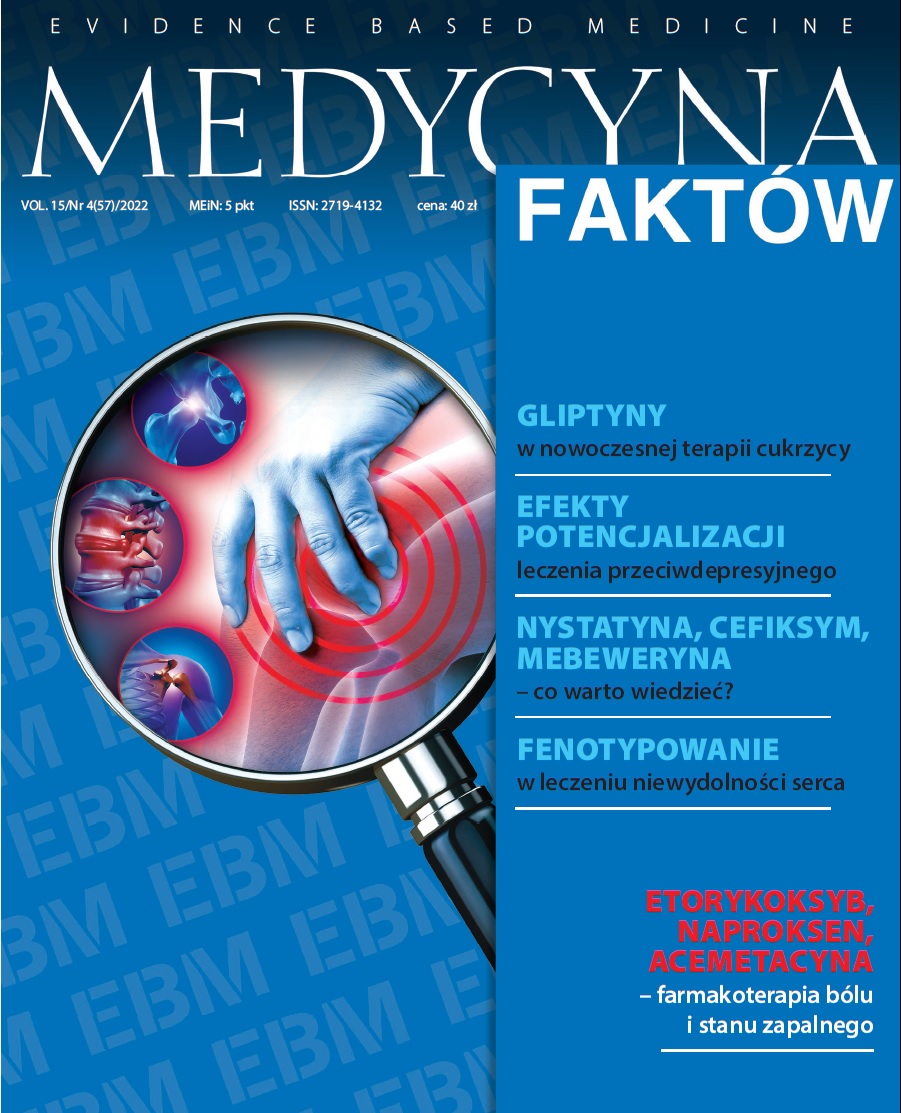Arypiprazol jako potencjalizacja leczenia przeciwdepresyjnego w depresji opornej na leczenie – jaki ma wpływ na procesy psychiczne? Opis przypadku
##plugins.themes.bootstrap3.article.main##
Abstrakt
Arypiprazol jest lekiem wskazywanym przez rekomendacje Polskiego Towarzystwa Psychiatrycznego i przez konsultanta krajowego jako jedna z opcji potencjalizacji dotychczas nieskutecznej terapii w depresji opornej na leczenie. Jest substancją, która wykazuje transdiagnostyczne działanie terapeutyczne, może być stosowany w monoterapii w kilku grupach zaburzeń. Natomiast w połączeniu z lekiem przeciwdepresyjnym może potencjalizować skuteczność terapii depresji. Jego wieloprofilowy mechanizm działania receptorowego pozwala na założenie, że moduluje on działanie kilku układów neuroprzekaźnikowych, co może wyjaśniać jego korzystny wpływ w wielu zaburzeniach psychicznych, a także w potencjalizacji leczenia przeciwdepresyjnego. W pracy omówiono dwa przypadki pacjentek z objawami zaburzeń depresyjnych opornych na leczenie i ze współistniejącymi zaburzeniami lękowymi, zaburzeniami snu oraz specyficznymi cechami przeżywania emocjonalnego, a także trudnościami psychologicznymi. Pacjentki podlegały w czasie leczenia politerapii obejmującej m.in. leki przeciwdepresyjne. Po dołączeniu arypiprazolu w dawce 15 mg nastąpiła znaczna poprawa w zakresie stanu psychicznego i funkcjonowania pacjentek, umożliwiająca powrót do pracy zawodowej. Wpływ arypiprazolu na funkcje psychiczne tych osób obejmował uaktywnienie procesów motywacyjnych, ciekawości, zaangażowania w eksplorację rzeczywistości, zmniejszenie intensywności myśli o negatywnej wartości emocjonalnej, zmniejszenie nasilenia odczuwanego lęku i niepokoju oraz poprawę funkcji poznawczych.
##plugins.themes.bootstrap3.article.details##
Copyright © by Medical Education. All rights reserved.
Bibliografia
2. Gałecki P, Bliźniewska-Kowalska K. Depresja oporna na leczenie – zalecenia Konsultanta Krajowego w dziedzinie psychiatrii. Psychiatr Pol. 2021; 55(1): 7-21. http://doi.org/10.12740/PP/OnlineFirst/115208.
3. Han C, Wang SM, Kwak KP et al. Aripiprazole augmentation versus antidepressant switching for patients with major depressive disorder: A 6-week, randomized, rater-blinded, prospective study. J Psych Res. 2015; 66: 84-94.
4. Han C, Wang SM, Lee SJ et al. Optimizing the Use of Aripiprazole Augmentation in the Treatment of Major Depressive Disorder: From Clinical Trials to Clinical Practice. Chonnam Med J. 2015; 51(2): 66-80.
5. Schweitzer I, Sarris J, Tuckwell V et al. Aripiprazole as augmentation therapy in bipolar patients with current minor or subsyndromal mood symptoms. Int J Bipolar Disord. 2013; 1(1): 1-5.
6. Quante A, Zeugmann S, Luborzewski A et al. Aripiprazole as adjunct to a mood stabilizer and citalopram in bipolar depression: a randomized placebo-controlled pilot study. Hum Psychopharmacol. 2010; 25(2): 126-32.
7. Murawiec S. Escitalopram, sertralina i wenlafaksyna w depresji – wybór oparty na dostosowaniu profilu leku do profilu pacjenta. Medycyna Faktów. 2016; 4: 300-5.
8. Murawiec S. Drogowskazy leczenia lęku i depresji. Zróżnicowane działanie leków wobec objawów depresji, lęku, zaburzeń snu – na przykładzie escitalopramu, duloksetyny, mianseryny, pregabaliny i kwetiapiny. Psychiatria Spersonalizowana. 2022; 1(1): 16-23.
9. Murawiec S, Gondek T, Sterna W. Farmakoterapia objawów zaburzeń nastroju i lęku w kontekście procesów separacyjnych i przekształcania relacji w rodzicami w kierunku dojrzałości i samodzielności emocjonalnej – spostrzeżenie kliniczne. Psychiatria Spersonalizowana. 2022; 1(1): 43-8.
10. Solmi M, Bodini L, Cocozza S et al. Aripiprazole monotherapy as transdiagnostic intervention for the treatment of mental disorders: An umbrella review according to TRANSD criteria. Eur Neuropsychopharmacol. 2020; 41: 16-27. http://doi.org/10.1016/j.euroneuro.2020.09.635.
11. Di Sciascio G, Riva MA. Aripiprazole: from pharmacological profile to clinical use. Neuropsychiatr Dis Treat. 2015; 13: 2635-47. http://doi.org/10.2147/NDT.S88117.
12. Szczypiński JJ, Gola M. Dopamine dysregulation hypothesis: the common basis for motivational anhedonia in major depressive disorder and schizophrenia? Rev Neurosci. 1018; 29: 727-44. http://doi.org/10.1515/revneuro-2017-0091.
13. Murawiec S. Światło we mgle. Czyli dlaczego lekarz powinien czytać opisy przypadków (citalopram + arypiprazol). In: Jarema M (ed). Analiza przypadków klinicznych w psychiatrii. PZWL, Warszawa 2016: 303-16.
14. Yeomans D, Moncrieff J, Huws R. Drug-centered psychopharmacology: a non-disgnostic framework for drug treatment. BJPsych Adv. 2015; 21: 229-36.
